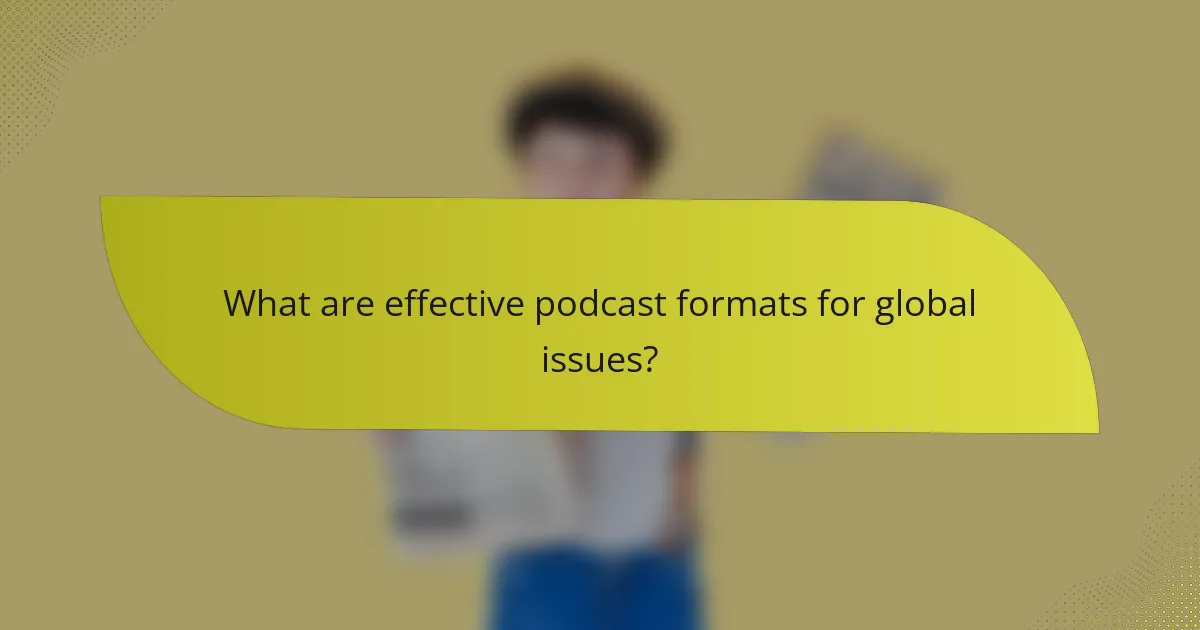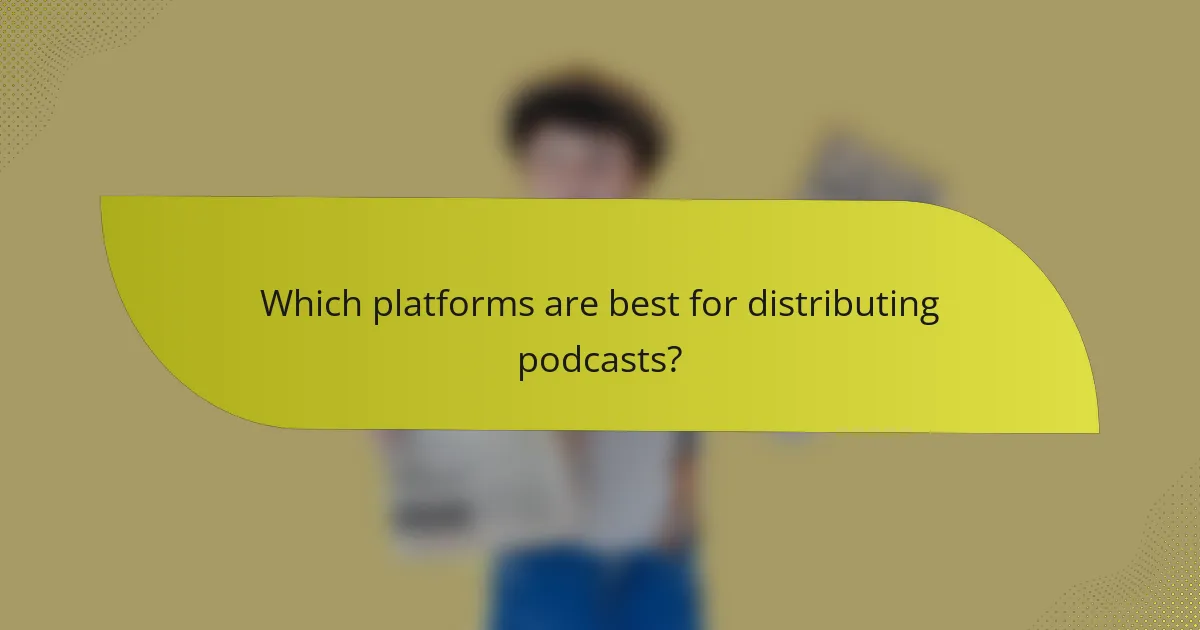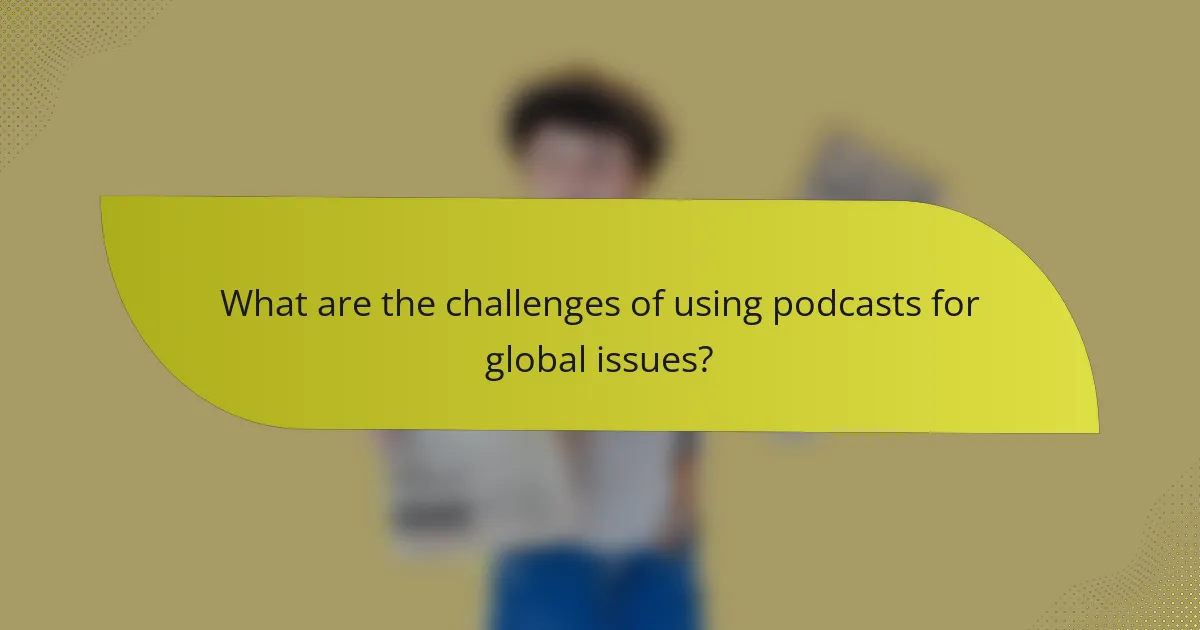Podcasts serve as a powerful tool for boosting audience engagement on global issues by delivering accessible and informative content that resonates with listeners. By featuring diverse voices and perspectives, they simplify complex topics, making them more relatable. Effective formats such as interview-style discussions and narrative storytelling further enhance listener engagement, while selecting the right distribution platforms ensures broader reach and impact.

How can podcasts enhance audience engagement on global issues?
Podcasts can significantly enhance audience engagement on global issues by providing accessible, informative content that resonates with listeners. They create a platform for diverse voices and perspectives, making complex topics more relatable and easier to understand.
Increased accessibility for diverse audiences
Podcasts are available on various platforms, allowing listeners to access content anytime and anywhere, which broadens their reach. This accessibility is crucial for engaging audiences from different backgrounds, including those who may not have the time or resources to attend live events or read lengthy articles.
Moreover, podcasts can cater to different languages and cultures, making global issues more relatable. For instance, a podcast series might feature episodes in multiple languages or include local case studies, helping to bridge gaps in understanding among international listeners.
Interactive formats fostering community discussions
Many podcasts encourage listener interaction through Q&A sessions, social media engagement, or live discussions, which fosters a sense of community. This interactivity allows audiences to voice their opinions and share personal experiences related to global issues, creating a more dynamic dialogue.
Additionally, incorporating listener feedback into future episodes can enhance engagement. For example, a podcast might dedicate an episode to addressing questions or comments from listeners, making them feel valued and more connected to the content.

What are effective podcast formats for global issues?
Effective podcast formats for global issues include interview-style discussions and narrative storytelling. These formats engage listeners by providing expert insights and personal experiences, making complex topics more relatable and understandable.
Interview-style podcasts with experts
Interview-style podcasts leverage the knowledge of experts to discuss global issues, offering listeners authoritative perspectives. This format allows for in-depth conversations that can cover a range of topics, from climate change to social justice, often providing actionable insights.
When creating an interview-style podcast, consider inviting a diverse array of guests, including academics, activists, and industry leaders. This variety enriches the content and appeals to a broader audience. Aim for episodes that last between 30 to 60 minutes to maintain listener engagement without overwhelming them.
Narrative storytelling to highlight personal experiences
Narrative storytelling in podcasts brings global issues to life by sharing personal experiences and stories. This format fosters emotional connections, helping listeners understand the human impact of issues like poverty, migration, and environmental challenges.
To effectively use narrative storytelling, focus on compelling characters and relatable situations. Episodes can range from 15 to 45 minutes, allowing for a deep dive into individual stories while keeping the audience’s attention. Incorporating soundscapes and interviews can enhance the storytelling experience, making it more immersive.

Which platforms are best for distributing podcasts?
Choosing the right platforms for podcast distribution is crucial for maximizing audience engagement. Popular platforms like Apple Podcasts and Spotify offer unique advantages that cater to different audience demographics and advertising strategies.
Apple Podcasts for broad reach
Apple Podcasts is one of the largest podcast platforms, making it ideal for reaching a wide audience. With millions of users, it provides a significant opportunity for creators to gain visibility and attract listeners from various backgrounds.
To optimize your podcast on Apple Podcasts, ensure your episodes are well-categorized and use relevant keywords in your descriptions. This helps improve discoverability and can lead to higher rankings in search results.
Spotify for targeted advertising opportunities
Spotify has rapidly become a leading platform for podcasting, particularly known for its targeted advertising capabilities. Creators can leverage Spotify’s data analytics to tailor their content and advertisements to specific audience segments, enhancing engagement.
When using Spotify, consider utilizing its dynamic ad insertion feature, which allows you to serve personalized ads based on listener demographics. This can significantly increase the effectiveness of your marketing efforts and drive better results.

How can podcasts drive advertising revenue?
Podcasts can significantly enhance advertising revenue by leveraging their engaged audiences and targeted content. By integrating ads seamlessly into episodes, creators can attract brands looking to reach specific demographics interested in global issues.
Dynamic ad insertion techniques
Dynamic ad insertion allows podcasters to place advertisements into episodes at the time of playback rather than during recording. This technique enables creators to update ads regularly, ensuring that they remain relevant and timely for listeners. For example, a podcast discussing climate change can swap in ads for eco-friendly products as they become available.
Using dynamic insertion can lead to higher engagement rates, as listeners are more likely to respond to current promotions. Podcasters should consider the balance between ad frequency and content quality to maintain listener interest and avoid fatigue.
Partnerships with brands aligned with global issues
Forming partnerships with brands that share a commitment to global issues can enhance credibility and attract sponsorships. These collaborations often lead to co-branded content, which can resonate more deeply with audiences. For instance, a podcast focused on social justice might partner with organizations advocating for equality, creating a natural fit for advertising.
When seeking partnerships, podcasters should prioritize brands that align with their values and audience interests. This alignment not only fosters trust but can also lead to more effective advertising, as listeners are more likely to engage with brands that reflect their own beliefs and concerns.

What metrics should be tracked for podcast success?
To measure podcast success, focus on key metrics such as listener growth, retention rates, and engagement levels. These indicators provide insights into audience behavior and the overall impact of your content on global issues.
Listener growth and retention rates
Listener growth refers to the increase in your audience size over time, while retention rates measure how many listeners continue to engage with your podcast after their initial listen. Tracking these metrics helps identify trends and the effectiveness of your content in attracting and keeping an audience.
Consider using analytics tools that provide insights into listener demographics and behavior. Aim for a growth rate of at least 10-20% per month for a healthy podcast, and strive for retention rates above 60% to ensure your content resonates with your audience.
Engagement through social media interactions
Engagement on social media platforms indicates how well your podcast resonates with listeners and encourages discussions around global issues. Metrics such as likes, shares, comments, and mentions can help gauge audience interest and involvement.
Utilize social media analytics to track interactions related to each episode. Encourage listeners to share their thoughts and experiences, and aim for a consistent increase in engagement metrics. A good practice is to respond to comments and foster a community around your podcast to enhance listener loyalty.

What are the challenges of using podcasts for global issues?
Podcasts face several challenges when addressing global issues, including content saturation and the need for diverse representation. These obstacles can hinder effective audience engagement and limit the impact of discussions on critical topics.
Content saturation in the podcast market
The podcast market is highly saturated, making it difficult for new shows to stand out. With millions of podcasts available, listeners often struggle to find content that resonates with their interests, particularly regarding global issues.
To navigate this saturation, creators should focus on niche topics within global issues that are underrepresented. Developing unique angles or formats can help capture audience attention and foster engagement.
Additionally, consistent branding and effective marketing strategies, such as leveraging social media and collaborations, can enhance visibility and attract a dedicated listener base.
Ensuring diverse representation in discussions
Diverse representation in podcast discussions is crucial for addressing global issues comprehensively. Without varied perspectives, conversations may become one-dimensional, failing to reflect the complexity of the topics at hand.
Podcasters should actively seek guests from different backgrounds, cultures, and experiences to enrich their content. This approach not only enhances the quality of discussions but also broadens the appeal to a wider audience.
Moreover, fostering an inclusive environment encourages listeners to engage with the content, as they see their own experiences and viewpoints represented. This can lead to increased loyalty and community building around the podcast.

How can podcasts be integrated into broader marketing strategies?
Podcasts can enhance broader marketing strategies by creating engaging content that resonates with audiences on global issues. By leveraging storytelling and expert insights, brands can foster deeper connections and encourage audience participation.
Cross-promotion with social media campaigns
Integrating podcasts with social media campaigns amplifies reach and engagement. Share episode highlights, quotes, and behind-the-scenes content on platforms like Instagram, Twitter, and Facebook to attract listeners and spark discussions.
Consider using targeted ads on social media to promote specific episodes, especially those addressing pressing global issues. Engaging visuals and compelling calls-to-action can drive traffic to your podcast and increase listener numbers.
Utilizing email newsletters to boost listenership
Email newsletters are an effective tool for promoting podcast episodes directly to your audience. Regularly feature new episodes, along with summaries and key takeaways, to keep subscribers informed and engaged.
Incorporate links to listen on various platforms, and consider offering exclusive content or early access to episodes for newsletter subscribers. This strategy can help build a loyal listener base while encouraging audience interaction through feedback and discussion prompts.
